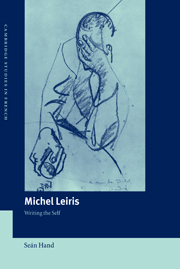Book contents
- Frontmatter
- Contents
- Acknowledgements
- List of abbreviations
- Introduction: the deaths of Michel Leiris
- PART I TEXTS AND CONTEXTS
- PART II THE QUEST FOR PRESENCE IN LA RÈGLE DU JEU
- 6 Excess of joy: the beginnings of presence in ‘ … Reusement!’
- 7 Organs of learning: sensing presence in Biffures
- 8 The act of union: being-in-the-world in La Règle du jeu
- 9 Thanatography: non-being as the limit of autobiography
- Conclusion: locating Leiris
- Notes
- Bibliography
- Index
6 - Excess of joy: the beginnings of presence in ‘ … Reusement!’
Published online by Cambridge University Press: 22 October 2009
- Frontmatter
- Contents
- Acknowledgements
- List of abbreviations
- Introduction: the deaths of Michel Leiris
- PART I TEXTS AND CONTEXTS
- PART II THE QUEST FOR PRESENCE IN LA RÈGLE DU JEU
- 6 Excess of joy: the beginnings of presence in ‘ … Reusement!’
- 7 Organs of learning: sensing presence in Biffures
- 8 The act of union: being-in-the-world in La Règle du jeu
- 9 Thanatography: non-being as the limit of autobiography
- Conclusion: locating Leiris
- Notes
- Bibliography
- Index
Summary
‘Nearness and presence, not the magnitude of separation, is what is essential.’ Heidegger's remark could stand as a definition of the guiding obsession of autobiography. Just as Western philosophy since Plato, according to Heidegger, has been grounded in parousia, or permanent self-presence, so the classical metaphysical origin and aim of autobiography is arguably the desire to confirm the autobiographer's ‘being in the sense of already-thereness (presence)’. In this regard, phenomenology, with its insistence on a descriptive philosophy of pure experience, based on pure subjectivity, offers a particularly interesting parallel to the autobiographical quest for self-presence. Husserlian phenomenology regards self-consciousness as taking place in an immediate and internal instant. In this light, autobiography is a secondary event, one whose representation merely confirms an absolute primary consciousness existing prior to reflection. From this first, essential, ahistorical point of self-intuition, one thereafter comes to speak of subject and object. It is this sense of pure presence which Derrida, in the spirit of Heidegger's (and Levinas's) destruction of Husserl, deconstructs in his essay ‘La Différance’. Derrida posits presence, ‘la forme matricielle absolue de l'être', as in fact always being a determination and an effect within a system of différance.
- Type
- Chapter
- Information
- Michel LeirisWriting the Self, pp. 151 - 157Publisher: Cambridge University PressPrint publication year: 2002



